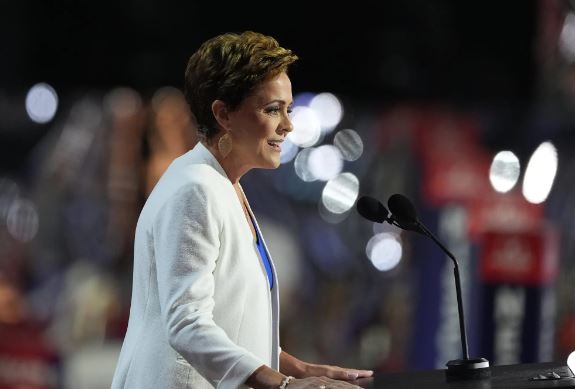Kari Lake secured the Republican nomination for the U.S. Senate seat in Arizona on Tuesday, as confirmed by The Associated Press. This victory sets up a pivotal contest in the upcoming fall election for the seat currently held by Senator Kyrsten Sinema, who is retiring. Lake’s win over Mark Lamb, the sheriff of Pinal County, continues her evolution from a former news anchor to a staunch supporter of former President Donald J. Trump.
Following her primary win, Lake expressed gratitude on X (formerly Twitter), stating, “Thank you for putting your faith in me, Arizona. I won’t let you down.” She will now face Democratic nominee Representative Ruben Gallego, a former Marine from the Phoenix area, who ran unopposed in his primary.
The contest between Lake and Gallego has already been marked by fierce exchanges. Lake has criticized Gallego as a “far-left radical” with lenient views on immigration, while Gallego has targeted Lake’s fluctuating stance on abortion rights and her persistence in making unfounded claims of election fraud. The two have agreed in principle to debate, with Gallego committing to it and Lake expressing some skepticism about the debate’s hosting by the state Clean Elections Commission, suggesting the need for a fair platform.
Gallego, after Lake’s primary win, reiterated his stance against her, stating that she has a “dangerous plan to ban abortion and hurt Arizonans,” and encouraged voters to support him in the upcoming general election.
Both candidates face challenges in appealing to independent and moderate voters. Polls show Gallego with a slight lead, along with a significant fundraising advantage. However, Lake’s campaign strategy focuses on rallying her base and addressing issues like border security and economic concerns, even as she continues her efforts to challenge the results of the 2022 gubernatorial race. Her divisive campaign style during that race, where she fully embraced Trump’s claims of election fraud, alienated some Republicans but also solidified her standing among the party’s base.
Since her gubernatorial run, Lake has attempted to repair relationships within the Republican Party, moderating her rhetoric while still pursuing legal action related to the 2022 election. This has led to a mixed response from mainstream Republicans, who have shown tentative support for her Senate bid while urging her to move away from election fraud claims.
Gallego, on the other hand, is working to distance himself from his progressive label, seeking to appeal to the centrist and moderate voters in Arizona. The state’s recent political history shows Democrats successfully leveraging Republican divisions to win statewide offices, a trend Gallego hopes to continue despite his progressive roots. His challenge lies in convincing enough moderate Republicans to cross party lines in a state that has seen shifting political dynamics.
While the National Republican Senatorial Committee (NRSC) has supported Lake’s campaign, the extent of future party support remains uncertain. Senator Steve Daines of Montana, the NRSC chair, emphasized the necessity of uniting Arizonans against Gallego, describing him as “one of the most radical Democrats in the country.”
This Senate race is particularly significant as Republicans do not necessarily need to win Arizona to gain control of the U.S. Senate, given other vulnerable Democratic seats. However, securing Arizona could solidify their efforts and broaden their Senate majority, making this election a crucial battleground in the broader national political landscape.

